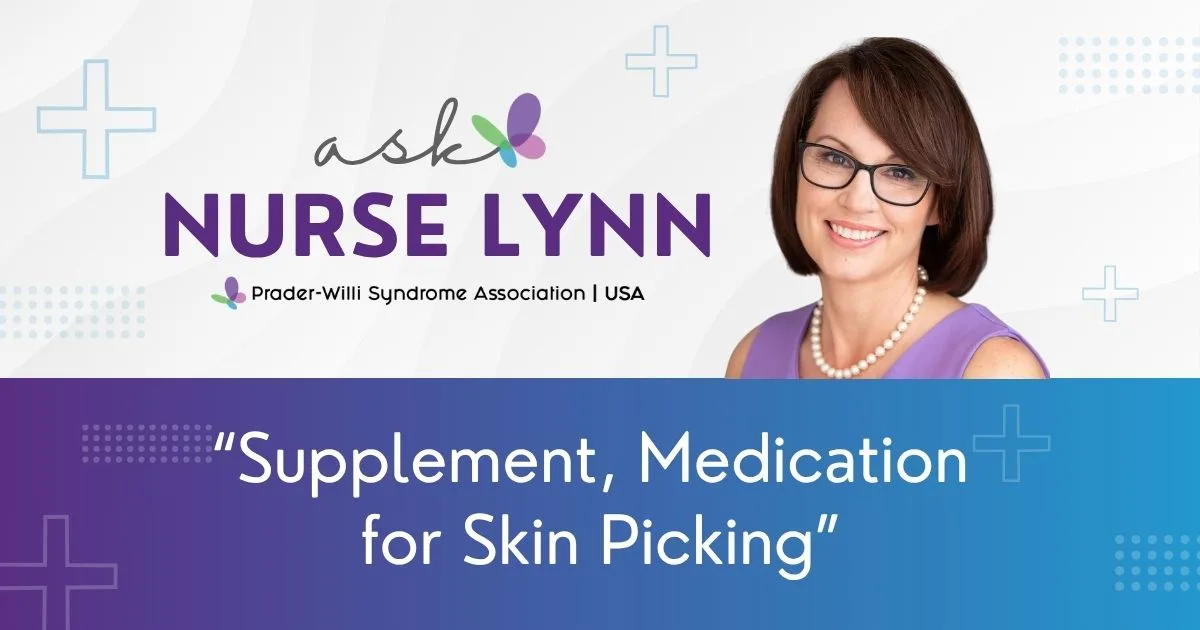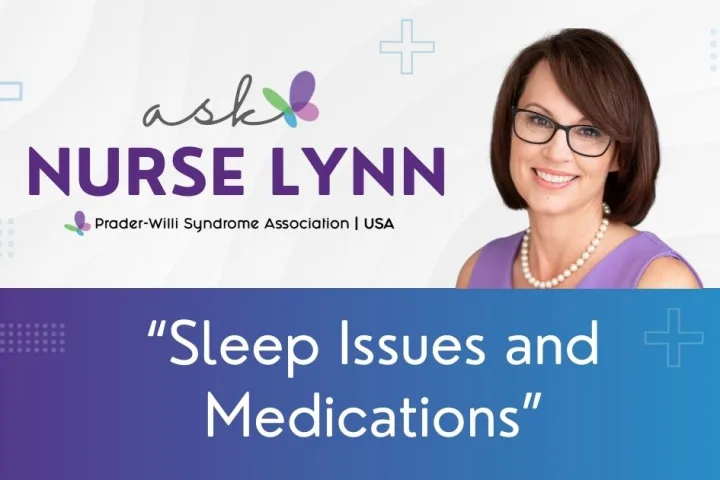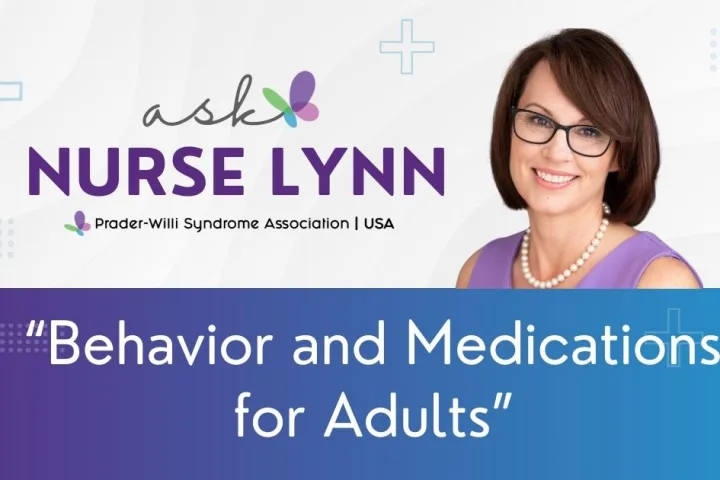Question:
Female, 61 years old, Deletion subtype
Are there any proven drugs to help with skin picking? My daughter stopped skin picking when she was about 12 and in the past year, she has started again. She cannot seem to stop. I have talked to all of her doctors about it and no one seems to know a solution. A nurse practitioner called a neurologist at Brighams and Women. Topiramate and n- acetylcysteine were suggested. I looked up both of them and they do not appropriate. Can you point me in the right direction?
Nurse Lynn’s Response:
Skin picking is a common and difficult behavior in individuals with PWS, often triggered or worsened by anxiety, transitions, boredom, or skin irritation. Your daughter’s history—stopping around age 12 and then restarting recently—is not uncommon, but it’s understandably frustrating when there seems to be no clear solution. While there is no universally effective medication, there are a few treatment options with some evidence of benefit with use under medical supervision.
N-acetylcysteine (NAC), an over-the-counter supplement that regulates glutamate in the brain.
Topiramate (Topamax), an anticonvulsant, has also been tried for compulsive behaviors, but with mixed results. It can cause side effects like cognitive slowing, fatigue, or weight loss, which can be especially concerning in individuals with PWS. While some neurologists may suggest it, it is not considered a first-line treatment unless the behavior is severe and unresponsive to safer interventions.
In addition to medications, behavioral strategies are crucial and often more effective when combined with medical treatment. Identifying triggers (like boredom, anxiety, or sensory needs) is key. Helpful strategies can include using visual reminders or physical barriers (such as gloves or bandages), offering fidget toys to meet sensory needs, and reinforcing periods when no skin picking occurs. Cognitive-behavioral therapy (CBT), Occupational therapists may also help with sensory replacements and coping tools.
It may also be helpful to have a comprehensive review of her current medications to assess whether any are helping or potentially contributing to the behavior along with keeping track of when the picking occurs and any changes to routine or food security.
Resources:
https://www.pwsausa.org/wp-content/uploads/2023/01/Skin-Picking-2022-1.pdf
https://ipwso.org/information-for-families/behaviour-and-mental-health/skin-picking/
https://www.sciencedirect.com/science/article/abs/pii/S0149763419306487
PWS and Skin Picking from Latham Centers
Do you have a non-emergency medical question for Nurse Lynn? Submit your question here:
Share this!





 Perry A. Zirkel has written more than 1,500 publications on various aspects of school law, with an emphasis on legal issues in special education. He writes a regular column for NAESP’s Principal magazine and NASP’s Communiqué newsletter, and he did so previously for Phi Delta Kappan and Teaching Exceptional Children.
Perry A. Zirkel has written more than 1,500 publications on various aspects of school law, with an emphasis on legal issues in special education. He writes a regular column for NAESP’s Principal magazine and NASP’s Communiqué newsletter, and he did so previously for Phi Delta Kappan and Teaching Exceptional Children. Jennifer Bolander has been serving as a Special Education Specialist for PWSA (USA) since October of 2015. She is a graduate of John Carroll University and lives in Ohio with her husband Brad and daughters Kate (17), and Sophia (13) who was born with PWS.
Jennifer Bolander has been serving as a Special Education Specialist for PWSA (USA) since October of 2015. She is a graduate of John Carroll University and lives in Ohio with her husband Brad and daughters Kate (17), and Sophia (13) who was born with PWS. Dr. Amy McTighe is the PWS Program Manager and Inpatient Teacher at the Center for Prader-Willi Syndrome at the Children’s Institute of Pittsburgh. She graduated from Duquesne University receiving her Bachelor’s and Master’s degree in Education with a focus on elementary education, special education, and language arts.
Dr. Amy McTighe is the PWS Program Manager and Inpatient Teacher at the Center for Prader-Willi Syndrome at the Children’s Institute of Pittsburgh. She graduated from Duquesne University receiving her Bachelor’s and Master’s degree in Education with a focus on elementary education, special education, and language arts. Evan has worked with the Prader-Willi Syndrome Association (USA) since 2007 primarily as a Crisis Intervention and Family Support Counselor. Evans works with parents and schools to foster strong collaborative relationships and appropriate educational environments for students with PWS.
Evan has worked with the Prader-Willi Syndrome Association (USA) since 2007 primarily as a Crisis Intervention and Family Support Counselor. Evans works with parents and schools to foster strong collaborative relationships and appropriate educational environments for students with PWS. Staci Zimmerman works for Prader-Willi Syndrome Association of Colorado as an Individualized Education Program (IEP) consultant. Staci collaborates with the PWS multi-disciplinary clinic at the Children’s Hospital in Denver supporting families and school districts around the United States with their child’s Individual Educational Plan.
Staci Zimmerman works for Prader-Willi Syndrome Association of Colorado as an Individualized Education Program (IEP) consultant. Staci collaborates with the PWS multi-disciplinary clinic at the Children’s Hospital in Denver supporting families and school districts around the United States with their child’s Individual Educational Plan. Founded in 2001, SDLC is a non-profit legal services organization dedicated to protecting and advancing the legal rights of people with disabilities throughout the South. It partners with the Southern Poverty Law Center, Protection and Advocacy (P&A) programs, Legal Services Corporations (LSC) and disability organizations on major, systemic disability rights issues involving the Individuals with Disabilities Education Act (IDEA), Americans with Disabilities Act (ADA), and the federal Medicaid Act. Recently in November 2014, Jim retired.
Founded in 2001, SDLC is a non-profit legal services organization dedicated to protecting and advancing the legal rights of people with disabilities throughout the South. It partners with the Southern Poverty Law Center, Protection and Advocacy (P&A) programs, Legal Services Corporations (LSC) and disability organizations on major, systemic disability rights issues involving the Individuals with Disabilities Education Act (IDEA), Americans with Disabilities Act (ADA), and the federal Medicaid Act. Recently in November 2014, Jim retired.